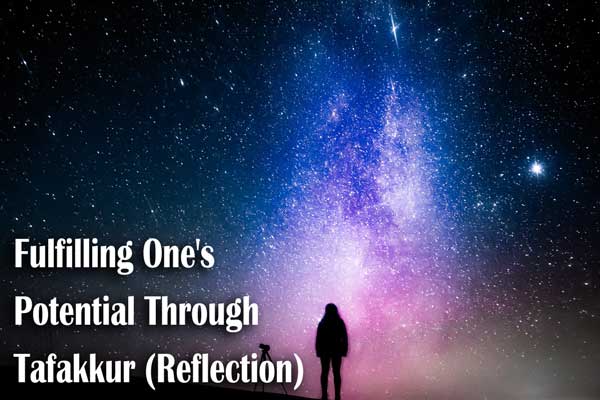“You should have some proportion of solitude or else you will become heedless.” -‘Umar b. al-Khaṭṭāb (r)
Among the greatest blessings God has bestowed upon human beings is the ability to reflect, to contemplate. The blessings of utilizing rational thought, thinking fully and deeply, introspecting, and conceptualizing — these inform the beneficial ability to immerse oneself in contemplation about a belief or idea or perception, striving to penetrate beyond its apparent meaning or value.
It does not make sense to confine our potential to goals that attach to this world with no investment in the life to come.
Hallmarks of Western civilization are belief in the human mind’s capacity for rational thought and the human condition being imbued with the right to dignity, well-being, and fulfillment. Contrary to anti-theistic claims, Islam emphasized both of these more than 14 centuries ago. Islam does not disregard the use of reasoning and reflecting in favor of blind faith. Instead, the ability to reason and reflect is praised by Allah in the Qur’an and is considered to be a faculty that has the potential to bring one closer to Allah and the truth. Islam, thus, is a rationally justified belief system, and the correct use of reasoning, alongside other faculties, brings one to Islam. Furthermore, the ability to reason and reflect opens the door to self-actualization – becoming the greatest version of oneself — in numerous ways. There are countless things to reflect upon, but here are a few foundational ones:
Reflecting on the Oneness of God, the Creator of the universe, and that He is source of blessings
“Do you not see that Allah has made subject to you whatever is in the heavens and whatever is in the earth and amply bestowed upon you His favors, apparent and hidden? But of the people is he who disputes about Allah without knowledge or guidance or an enlightening Scripture” (Qur’an 31:20).
“And every bounty that you have is from Allah…” (Qur’an 6:53).
While we recognize the great benefits of a “productivity” culture in offering technologies, optimizing resources and methodologies, and encouraging lifestyles of goal-orientation, striving, and efficiency, one can never fulfill their greatest potential without the blessings of Allah, the source of all blessings. “Blessed is the One in Whose Hands rests all authority, and He has power over all things” (Qur’an 67:1). The Kingdom belongs to Him, and all blessings come from Him, and the believer regularly recites Surat al-Mulk (The Sovereignty), the 67th chapter in the Qur’an, and asks God for blessings while expressing gratitude for everything He has bestowed upon him.
Reflecting on the fact that Allah created the universe with purpose, and recognizing one’s need for God in order to fulfill one’s own purpose
“Indeed, in the creation of the heavens and the earth and the alternation of the night and the day are signs for those of understanding; those who remember Allah while standing, sitting, and lying on their sides, and reflect on the creation of the heavens and the earth and pray, ‘Our Lord! You have not created all of this without purpose. Glory be to You! Protect us from the torment of the Fire’” ( Qur’an 3:190-191).
We all have our dreams of what we want to accomplish and, if we are realistic, we set goals to achieve them. Yet, without belief in and worship of Allah, we will not achieve the ultimate purpose of our existence — a place in Paradise. “Have they not reflected upon their own selves? Allah only created the heavens and the earth and everything in between for a purpose and an appointed term. Yet most people are truly in denial of the meeting with their Lord!” (Qur’an 30:8).
Reflecting on the Qur’an and its signs, and recognizing its origin from God
“Do they not then reflect on the Quran? Had it been from anyone other than Allah, they would have certainly found in it many inconsistencies” (Qur’an 4:82).
By reflecting on the Qur’an, the stories of past nations, the signs of God all around us, and the miraculous nature of the final Message, the believer is re-motivated to strive harder for God’s pleasure and eternal paradise. There is no greater purpose for the believer than true belief in God, submission to His command, exemplification of the Prophet’s model of Islamic living in worship, attitude, speech, and action, and the teaching of the Islamic truth to the world.
Reflecting on the inevitability of death and what comes after
“Every soul will taste death, and you will only be given your full recompense on the Day of Resurrection. So, he who is drawn away from the Fire and admitted to Paradise, then surely he is successful. And the life of this world is nothing except the enjoyment of delusion” (Qur’an 3:185).
The role of death in fulfilling one’s greatest potential cannot be emphasized enough. The awareness of human beings of their inevitable death, and the embracing and accepting of that reality that we are temporary residents of this earth, should motivate us to prepare for what comes after it.
Too great an attachment to this worldly life makes the thought and reality of death very difficult, while wisdom necessitates preparation for what all human beings know is inevitable. Therefore, psychological escapism from the reality of death is unwise and futile, and it prevents an individual from attaining the greatest heights of self-actualization. While anxiety about death is not to be belittled, escapism does nothing for the one who wants to prepare and succeed in attaining Paradise. A man from the Ansar asked the Prophet (s) which of the believers is wisest. The Prophet answered, “The one who remembers death the most and is best in preparing for it. Those are the wisest” (Ibn Majah).
Imagine, if you will, a man being informed of a pending hurricane and being provided instructions and a map to escape safely. Imagine if this man redirected and rechanneled his fear of the hurricane by distracting himself with mindless television, hours of streaming content, useless video games, and other worldly diversions. Does his escapism truly provide an escape from what is inevitable? Of course not! While the hurricane might veer on its course and miss the man’s house, no human being, regardless of his religious belief or earthly status, can escape death. It is an inevitable moment guaranteed for all human beings. Running from the thought of it does not stop it from manifesting in our lives. We are not meant to remain in this world. “Say, ‘the death you are running away from will inevitably come to you. Then you will be returned to the One who knows the unseen as well as the seen, and He will inform you of what you used to do’” (Qur’an 62:8).
Reflecting on the temporality of this world and its insignificance compared to the afterlife
Abu Dawood At-Tayalisi recorded from Jabir that the Prophet (s) said, “Jibril said, ‘O Muhammad! Live how you wish, for verily you will die; love what you wish, for verily you will part with it; and do what you wish, for verily you will meet it [your deed].’”
By recognizing the temporality of this world, one’s efforts are redirected to greater purpose and potential. By keeping in mind the transitory nature of this life, we strive for that which is significant in an enduring way. We exert our efforts towards that which will be worth it in hindsight (in the afterlife). Self-actualization is to know that whatever you strive for in this life must be truly aligned with your greatest objective, which is a place in Paradise. In contrast, our potential is limited when we become overly attached to the things of this world. The significance of this world is in proportion to how much of it you use for attaining the reward in the afterlife — how much we make efforts for the sake of God, for establishing lasting continuous charities, for a beneficial and sincere legacy of good deeds.
The Prophet (s) said, “What is the example of this worldly life in comparison to the Hereafter other than one of you dipping his finger in the sea? Let him see what he brings forth” (Muslim). One who dips his finger into any body of water sees how insignificant the few drops are compared to the sea or ocean. The temporality of this world and all that it contains of desires, comforts, and happiness is unimaginably insignificant compared to the eternal world of the Hereafter.
Thus, the true home for the believer, and the source of motivation and the fulfillment of one’s potential, is the Hereafter. Allah says, “This worldly life is nothing but diversion and amusement. Verily, the home of the Hereafter is the true life if only they knew” (Qur’an 29:64). It does not make sense to confine our potential to goals that attach to this world with no investment in the life to come.
Do not become attached to what is temporary. Do not become attached to what is a distraction. Attachments will make inevitable departure more difficult; attachments distract us from greater priorities, distort our expectations and grasp of realities, and cause us to become entitled and ungrateful. Attachments can become the source of future regrets and can shackle us to worldly desires and achievements. You are liberated in proportion to how much you submit to God and focus on the Hereafter, and your potential is increased in proportion to how much you are truly liberated. All people strive – and the greatest success is reserved for the one who strives for what is eternal.
“Each person will have nothing except what he strives for. And what he strives for, he will come to see [in the next life]. Then he will be fully rewarded for it; and that to your Lord is the ultimate return of all things” (Qur’an 53:39-42). While we strive to unlock greater potential by seeking God’s pleasure and Paradise, we ask Him for well-being in this life; and we act out of that well-being consciously, for His sake, as a means of coming closer to Him and our ultimate objective.
“Our Lord, give us goodness in this life and goodness in the Hereafter and save us from the punishment of the Hellfire” (Qur’an 2:201).
Spending time in solitude and silence so as to engage in contemplation can lead to increased self-awareness, deeper understanding, and gratitude, as well as rewards and celebration on the Day of Judgment.






